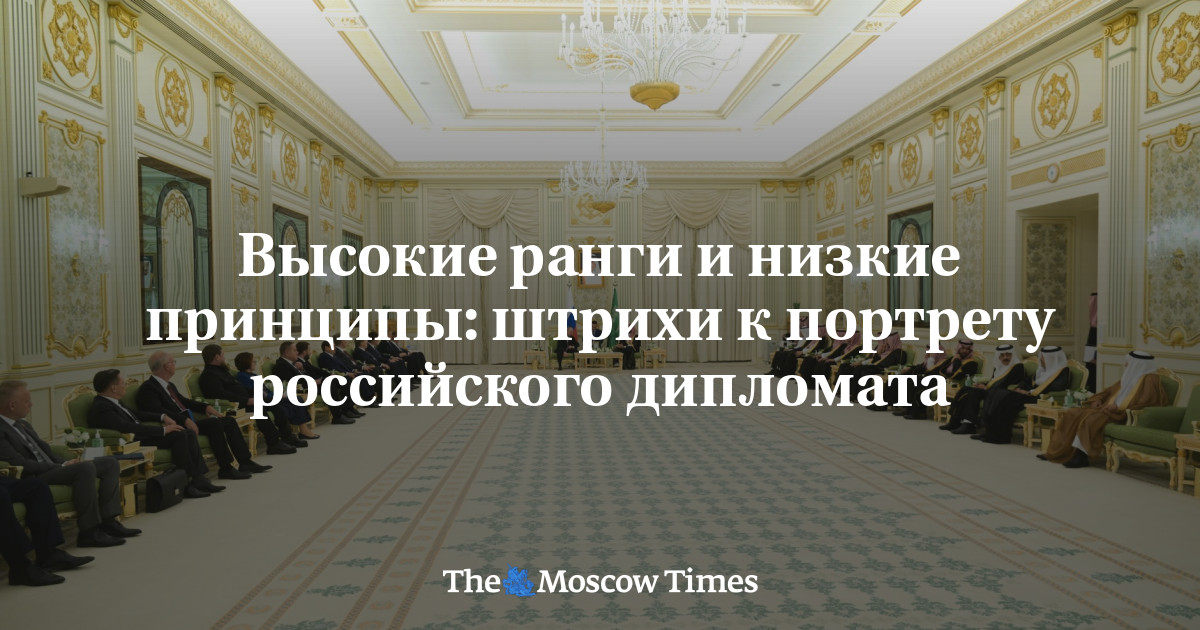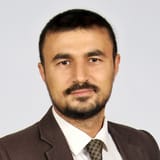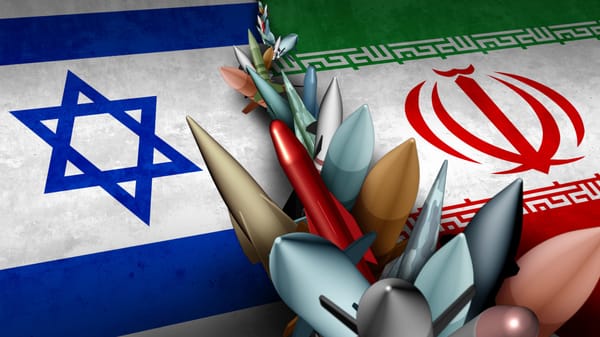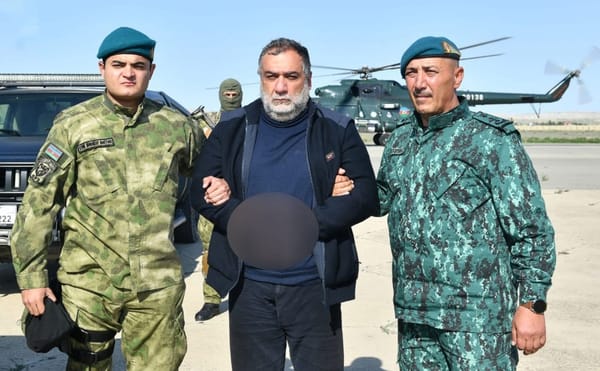High Ranks and Low Principles: Portrait of a Modern Russian Diplomat
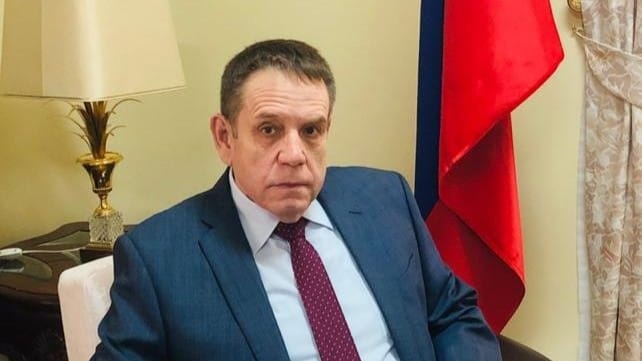
In high-profile negotiations between Russia and the United States in Riyadh, the general public usually sees only the visible aspects: delegation meetings, briefings, press statements, and so forth. However, while observing such events, few people think about who organizes and manages all this activity.
Behind the scenes of major international events at this level—ranging from arranging transportation to translating technical documents—responsibilities typically fall to the employees of the national diplomatic mission in the host country. In other words, the organizational aspects of the Russian side of the negotiations held in Riyadh were managed by staff members of the Russian Embassy in Saudi Arabia, headed by the current Ambassador Extraordinary and Plenipotentiary, Sergey Georgievich Kozlov.
Diplomat and Corrupt Official
Sergey Kozlov has occupied the position of head of the Russian diplomatic mission in Riyadh since the already distant year of 2017. Even by the standards of Russia’s conservative and inflexible diplomatic service, this is an unusually long tenure. It appears even more inconceivable to his American counterparts, with whom Kozlov inevitably interacted during preparations for various visits. American diplomats rarely spend more than two consecutive years on a foreign assignment.
However, Kozlov is notable not only for the extraordinary duration of his posting but also for his "professional" skills—an exceptional ability to turn the lives and work of his subordinates into a living hell, and the budget of the diplomatic mission entrusted to him into a smooth extension of his own pocket. Against the generally gray and faceless backdrop of Russia's current diplomatic elite, Kozlov primarily stands out due to his extremely average—meaning quite low—level of personal qualities. Thus, one can confidently say that today the overwhelming majority of Russian diplomats, one way or another, serve under the supervision of similar "Kozlov-types." As fate would have it, I am now able to recount this unforgettable experience first-hand.
I had the "privilege" of serving under Sergey G. Kozlov in the Russian Embassy during my first diplomatic posting in Yemen (2010–2013). Incidentally, even Kozlov’s portrait on the website of the Russian Embassy in Saudi Arabia was, in fact, taken in Sana'a during his posting in Yemen. I will not attempt to guess why, in the 12 years since leaving Yemen, he has never bothered to take another photograph. Nevertheless, I will gladly share what it was like to "work in Russia’s interests" alongside him.
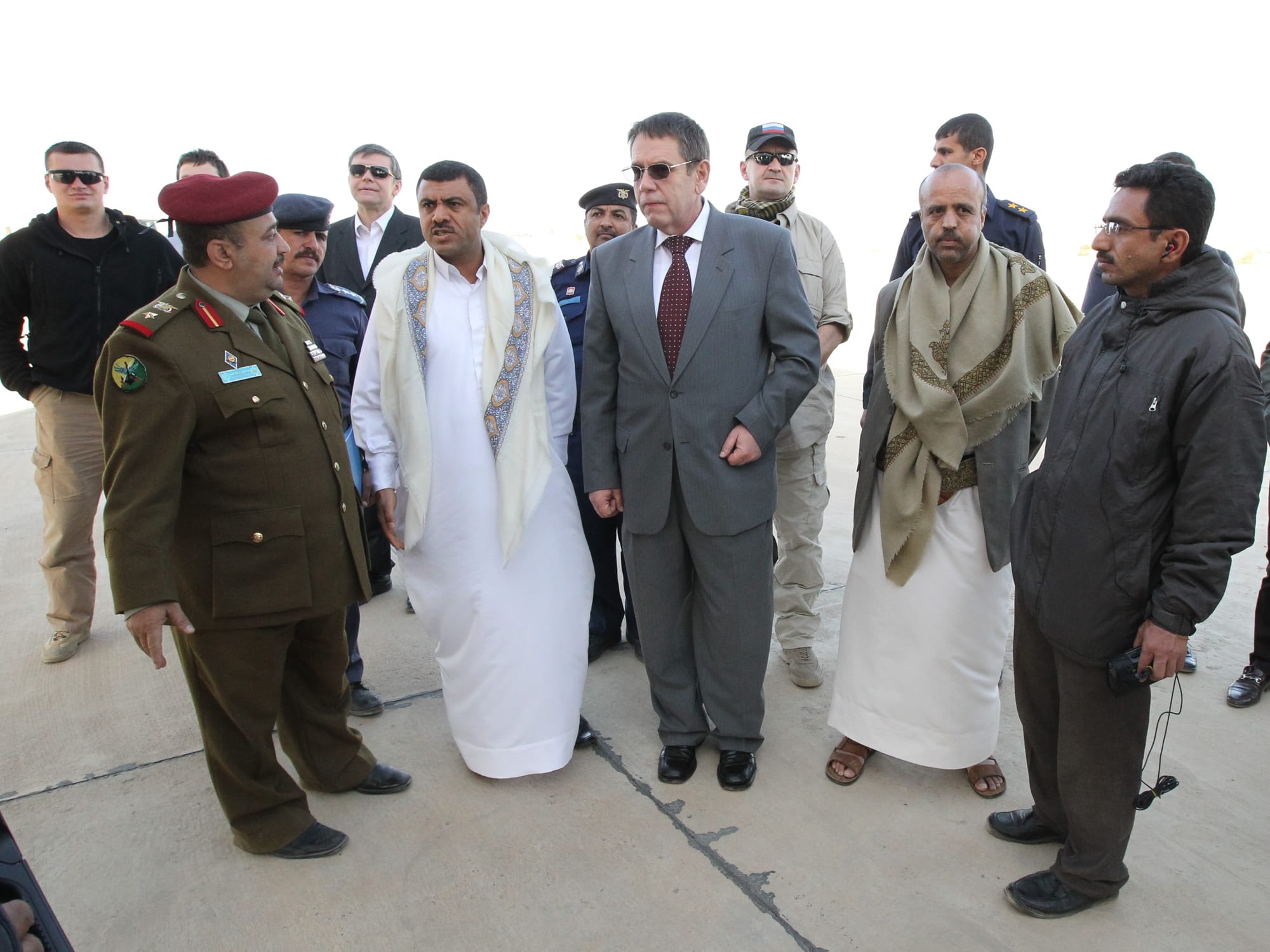
Yemen Diary
Whenever time permits, I always try to keep a diary. I did the same during my posting in Yemen from 2010 to 2013. However, contrary to my expectations, these notes did not become a record of my experiences in the Middle East or my first-ever overseas assignment. Instead, these writings, made six thousand kilometers away from Moscow, unexpectedly turned into a diary about Russia itself. Corruption and bureaucratic abuse, indifference to people's problems coupled with officially encouraged incompetence, and criminal negligence and irresponsibility resulting in the deaths of several embassy employees—all these issues appeared on the pages of my diary instead of anticipated descriptions of exotic experiences and Yemeni landmarks.
Sergey Kozlov personally confirmed the old saying that a fish rots from the head. Throughout the entire three years working under his leadership at the Russian Embassy in Yemen, I witnessed such blatant disregard for law, human morality, and people’s lives and fates that I could never have imagined before. The mere fact that people like him get appointed to high-ranking government positions, yet create absolute chaos in their assigned areas and shamelessly embezzle state funds without any repercussions, clearly indicates the profound decay within the Russian state system.
Even the limited information I gathered through rumors and snippets of careless conversations was enough to horrify me with the extent of corruption and lawlessness within Russia's Foreign Ministry.
Salaries of Subordinates
During my posting in Yemen, I was forced to initiate several inquiries regarding unpaid portions of my salary and various other allowances provided by the Russian Labor Code. On multiple occasions, I spoke directly to Sergey Kozlov about this issue. Each time, however, he gave me such an undiplomatic refusal that it could only come from a person absolutely confident in his impunity.
From the summer of 2011 onward, the Consular Section, where I worked, was left without a cashier. The woman who previously held this position had been evacuated to Russia as part of a diplomatic mission staff reduction triggered by the onset of Yemen's civil war. Her responsibilities effectively fell upon me and my colleague in the Consular Section. We couldn’t refuse these tasks, since maintaining the cash register was essential for serving visitors. However, our repeated requests to embassy management to distribute the cashier's salary between us led nowhere. Later, we accidentally discovered that Kozlov simply pocketed the money allocated for that position.
Like many other embassy employees, I often had to work on weekends, official holidays, and at night. These instances are clearly regulated by the Labor Code of the Russian Federation (Articles 153 and 154), explicitly requiring either additional rest periods or payment at no less than double the regular hourly rate. Naturally, we received neither compensation nor additional rest days.
The most striking example of such violations was the daily diplomatic duty shift. Each day—including weekends—a junior diplomat was assigned as the embassy’s on-duty officer. This diplomat had to answer phone calls, act as an interpreter, and perform other urgent tasks. Monthly duty schedules were signed by junior diplomats as mandated by the Labor Code. In other words, the embassy always possessed an official document obliging the accounting department to pay out these overtime wages. However, we never saw this money. Formally issued by the accountant, these funds were traditionally appropriated by the ambassador.
Another significant area of fraud involved vacation pay. When I first left Yemen on vacation in May 2011, the embassy accountant, N.V. Golovkina, paid me approximately $5,000. My colleague in the Consular Section—who had the same rank and held an identical position—received the same amount. Upon returning from vacation, we found detailed guidelines on calculating vacation pay online and performed the calculation ourselves. According to our findings, each of us should have received over $9,000. Thus, each of us had been short-changed by around $4,000 on vacation pay alone in 2011.
While experiencing corruption firsthand, I also repeatedly witnessed similar actions directed against other embassy staff. Personnel of the special security unit "Zaslon" (a division of Russia’s Foreign Intelligence Service tasked with physically protecting diplomatic missions) were especially vulnerable. The security team rotated every three months, which prevented them from realizing promptly that part of their salary was withheld. By the time their assignment was nearly over, it was usually too late to address the issue.
One member of this security group, nearing the end of his three-month posting, confided to me privately that upon leaving for Yemen, he had expected to return home with about $22,000–23,000. When we calculated his actual earnings, it became clear that he had been deprived of a significant portion of his salary. By the time he realized this, it was too late to take action.
The paramilitary security group attached to the Russian Embassy in Yemen consisted of eight people. Thus, Sergey Kozlov (clearly in collusion with the accountant) was siphoning off about $16,000 from security staff salaries alone. Even worse, this embezzlement concerned payments for shifts associated with the highest risk—duties performed during periods of heightened terrorist threat. In other words, these people, separated from their families and facing danger far from home, did not receive the compensation specifically designated for the most hazardous aspects of their duties.
Another major scheme involved vacation payments. Beyond unpaid exhausting duties and night shifts, the ambassador engaged in significant fraud with vacation pay calculations. Additionally, Kozlov was pocketing funds intended to pay cleaning personnel, including the person assigned to clean the building entrance where security guards lived. As a result, aside from numerous exhausting duties and unpaid night shifts, the guards were forced to sweep and mop their building entrance themselves—entirely for free.
Embassy Budget—Ambassador’s or Embassy’s?
During Sergey Kozlov’s tenure as the Russian Ambassador in Yemen, the line separating the embassy’s budget from his personal pocket became extremely blurred. Without Kozlov’s direct approval, even the embassy clinic’s doctor was unable not only to purchase necessary medications but even to provide staff members with the medications already available.
I experienced this issue firsthand when I became severely ill after catching a cold—incidentally, during one of those unpaid late-night airport trips I mentioned earlier. The embassy doctor prescribed medication for me but insisted I purchase it myself, even though the clinic had the medications in stock. She then explained to me that the Ambassador had prohibited using existing medicines—to avoid the cost of replacing them—and instructed employees to buy medicine at their own expense.
Frankly, setting aside the obvious legal, moral, and ethical issues involved, this might not have been such a significant logistical problem had we been allowed timely trips to a pharmacy. However, Kozlov restricted embassy staff’s freedom to leave the compound to such an extent that even purchasing medicine became practically impossible. Officially, these restrictions were justified by security concerns. But in reality, Kozlov simply sought to absolve himself of any potential responsibility in case of incidents. Like any typical Putin-era bureaucrat, he preferred to eliminate problems rather than solve them.
As a result, each departure from the embassy grounds required recording in a special logbook at least three days in advance, so that an escort from the "Zaslon" security unit—assuming its personnel weren’t busy mopping floors in the stairwells—could be arranged. Even then, this did not guarantee departure at the requested time. Consequently, embassy staff not only failed to receive proper medical care but even struggled to buy medication independently.
During Kozlov’s posting in Yemen, three embassy employees died due to delays in receiving medical assistance: Valery Baryshnikov in June 2011, Aidar Tuigunov (the embassy’s press attaché, whose duties I subsequently assumed) in October 2012, and Alexander Safronov in February 2013. Each became a victim of Kozlov’s greed—he even embezzled funds intended for medicine.
Another source of the Ambassador’s illicit income came from appropriating funds designated to pay the embassy’s electricity bills. These expenses were evenly distributed by the accounting department among all staff members. As a result, each employee was forced to pay not only for their own household electricity consumption but also for lighting around the embassy perimeter, electricity in administrative and technical buildings, and even the luxurious two-story residence of Ambassador Kozlov himself.
While comfortably seated in that residence, Kozlov devised additional methods for embezzling state funds, including classic schemes popular among Russian ambassadors, such as reporting lavish celebrations that never actually took place. One notable example was a supposed reception marking Diplomatic Workers’ Day, allegedly held on February 10, 2013, at the prestigious Sheba Hotel. According to official documents, 179 guests attended the reception, costing the embassy more than $4,000. In reality, this reception never occurred—nor did four similar events documented as celebrations of Victory Day, Russia Day, and Unity Day in 2012, as well as another Victory Day in 2013. In fact, there were likely many more such fabricated events. I can confidently speak only about cases I directly encountered and documented in my diaries.
While the Ambassador embezzled budget funds, some embassy employees were forced to spend their own money on essentials provided to them by law. For instance, in 2013, embassy security personnel decided to build a restroom in their duty room. Although seemingly trivial, it was essential for staff who spent long hours monitoring surveillance screens without the possibility of stepping away even briefly.
The decision to build the restroom had been made a year earlier, with funds allocated for it—but those funds mysteriously proved insufficient. Ultimately, the guards had to pay for construction materials themselves and perform the construction (including laying concrete walls and installing plumbing) during their own free time, often after night shifts. In particular, the embassy’s engineer spent about 29,000 Yemeni rials (approximately $120) from his own pocket to buy a door for the restroom.
Upon learning about this, I suggested the guards and the engineer file a joint complaint demanding reimbursement and offered to support them by adding my signature. They received my suggestion unenthusiastically, remarking that they “didn't want trouble.”
Construction and renovation projects represented another major area of corruption. Sergey Kozlov embezzled significant sums during the construction of a new perimeter wall around the embassy between 2011 and 2013. To maintain appearances, I was tasked with translating two price proposals (one from Arabic, the other from English) for constructing a portion of the wall around the embassy complex. One company offered to complete the project for $91,000; another quoted $93,000.
Despite these reasonable offers, the bid was awarded to a Russian company that proposed building the same section for $500,000. Of this amount, only around $100,000 was intended for actual construction—comparable to real market prices. The remaining $400,000 was earmarked for division among participants: $200,000 for the company and another $200,000 for corrupt Foreign Ministry officials, including about $40,000 intended personally for Ambassador Kozlov.
This particular embezzlement resulted in a humorous misunderstanding. When the foreman was negotiating how to split the money with the Ambassador, he attempted to bargain down the share allocated to the Foreign Ministry by starting low. He said, “Your share is $50,000.” Kozlov misunderstood, believing this figure referred solely to his personal cut, and quickly agreed, assuming he would receive $10,000 more than promised. When the scheme was executed and the misunderstanding discovered, it emerged that the foreman pocketed about $80,000 from the project, while Kozlov himself received less than $8,000—accompanied by mocking comments from his Foreign Ministry accomplices.
This temporary financial success cost the foreman his career: Kozlov ensured he was excluded from future projects.
A similar scenario reportedly unfolded during construction of the perimeter wall around the Russian Consulate General in Aden (southern Yemen).
Beyond major projects, which allowed for large-scale theft, many minor scams also occurred. For instance, installing wooden handrails in a three-story embassy residential building staircase cost $3,800. I had the "honor" of translating receipts and cost estimates for embassy accounting, which allowed me to see the amount. I’m no expert carpenter, but nearly $4,000 for ordinary wooden rails bolted to the walls seems unreasonably expensive.
I was equally surprised by embassy management’s determination to equip the Consular Section with cutting-edge technology as quickly as possible. To clarify my astonishment: this was a nearly collapsing, makeshift structure built hastily in 1972 without a foundation, intended for temporary use of no more than five years. By 1977, at the latest, it should have been demolished and replaced. Yet it remains in use to this day.
In 2012, the wiring in this building was so deteriorated that new biometric passport equipment, recently delivered, had to be disconnected. Whenever it was switched on, it overloaded the circuits and shut down power throughout the entire building. Yet despite this, even after installing biometric equipment, management continued adding more computers, servers, cameras, and surveillance technology to the same structure—ironically at the very moment when discussions were ongoing about demolishing and replacing it entirely. Clearly, no logical explanation existed other than the intention by interested parties to embezzle funds under the guise of upgrading a structure destined soon to be demolished, conveniently burying evidence of misuse of funds in its ruins.
The Ambassador and His Servants
Perhaps the instances of corruption described above would not have irritated and frustrated people so much if not for Sergey Kozlov’s extremely arrogant and deliberately degrading attitude toward his subordinates.
In February 2013, the embassy doctor struggled for days to arrange a dental appointment outside the embassy for two technical employees. Eventually, after considerable difficulty, they received permission to leave and were allocated an escort from the “Zaslon” security detail. However, just as they were preparing to depart at the scheduled time, Ambassador Kozlov cancelled their trip, redirecting the security escort to accompany the embassy's administrative manager to a grocery store. Suddenly, the Ambassador wanted kefir (a fermented dairy milk beverage), and since he hadn't previously arranged for its purchase, it urgently became a higher priority.
The doctor immediately called the Ambassador to explain that two staff members had been subsisting on painkillers for almost a week, unable to eat properly. Kozlov replied bluntly that, first, he wasn't interested in the problems of technical staff (adding, in essence, that anyone unhappy was welcome to fly home immediately), and second, the embassy was not a health resort or a sanatorium for medical treatment. Thus, instead of two sick employees visiting the dentist, only the Ambassador’s kefir shopping trip took place. Such incidents were commonplace.
As experience showed, however, the Ambassador displayed complete disregard not only toward technical employees but also toward diplomatic personnel. In September 2011, I was evacuated from Yemen during the embassy's second wave of personnel reductions due to the outbreak of the civil war. In November, I was asked to return, purchasing the ticket myself. Ambassador Kozlov personally assured me—indeed, promised—that all travel expenses would be reimbursed upon my return. Trusting him, I bought a ticket for $800 and returned to my post.
Needless to say, no reimbursement occurred. Once I arrived in Yemen, Ambassador Kozlov and embassy accountant Golovkina both insisted it was impossible to reimburse me, citing accounting rules. All I could do was resign myself to the loss. Kozlov concluded our discussion cheerfully: “Don’t worry, you'll earn much more here anyway.” The last time I'd heard such a phrase was in Moscow, at a sales office of a popular cosmetics brand, where I tried to make extra money during my impoverished student days.
Surprisingly, there were even more egregious examples, extending beyond ordinary human baseness. In 2013, for his own birthday (March 14), Ambassador Kozlov decided he wanted an expensive Swiss watch. Through senior diplomats, he instructed all embassy employees to contribute toward buying him this gift. Employees at my salary level, myself included, had to contribute $50 each, while others were asked for different amounts according to their salaries.
Upon concluding his assignment in Yemen, Kozlov repeated this evidently successful scheme—this time for an expensive, top-of-the-line smartphone. Fortunately, this device turned out cheaper than the watch; I, among others, paid just $30.
A vivid illustration of the atmosphere created by corruption and arbitrariness in the embassy occurred on June 24, 2013. That day, Ambassador Kozlov had a scheduled meeting with representatives from the UN World Food Programme. When their motorcade arrived at our embassy, the automated entry gates became jammed. These gates frequently malfunctioned due to age, neglect, and lack of maintenance, and desperately needed replacement—but the accounting department consistently “lacked” funds for this.
It was a Monday, a designated reception day at the Consular Section. A crowd of people—both Russian and foreign citizens—had gathered outside the gates. When the gates stopped opening, the duty security officer urgently summoned the embassy engineer as well as me and my Consular Section colleague (since we were nearest to the gate) to open them manually.
As a result, in front of the waiting UN delegation and a bewildered crowd of onlookers, Russian consuls abandoned visitors in the waiting room, and—wearing suits and ties—pushed back and forth filthy, rusty gates while the engineer tried to lever them with a metal bar. After witnessing this incident, I had no further questions about why Russia is mocked internationally and why no one respects it. But that is a topic for another article...
As I conclude this one, let me add only that after his Yemen posting, Sergey Kozlov enjoyed a deserved promotion. First, he became Deputy Director of the Middle East and North Africa Department at Russia’s Foreign Ministry, and then—as we now know—was appointed Ambassador to another country, far richer and more prestigious than impoverished, backward Yemen. Let me remind you that the appointment of ambassadors is personally signed by Russia’s president, Vladimir Putin. And given that Kozlov has already spent more than twice as long in Riyadh as he did in Sana'a, the opportunities for illicit enrichment must evidently be far greater there than in Yemen…
You can download the text of this article in Russian at the link below.
This article is also published in other media.
